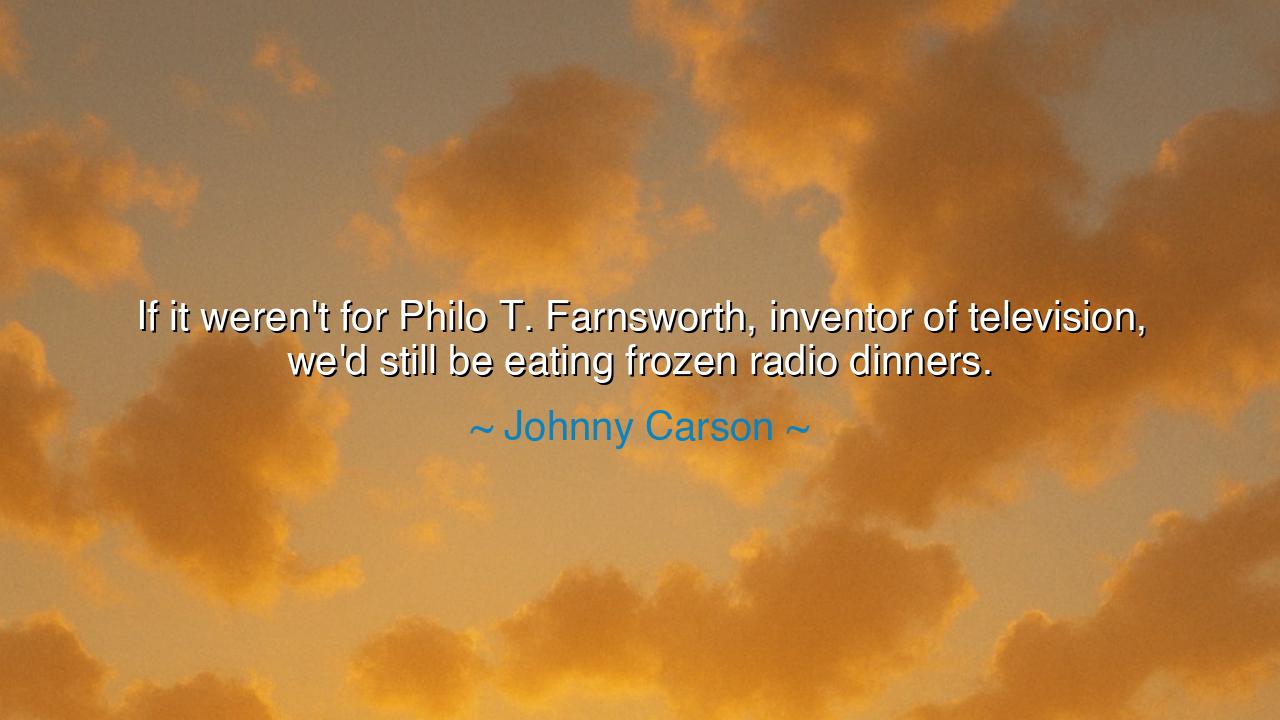
If it weren't for Philo T. Farnsworth, inventor of television
If it weren't for Philo T. Farnsworth, inventor of television, we'd still be eating frozen radio dinners.






"If it weren't for Philo T. Farnsworth, inventor of television, we'd still be eating frozen radio dinners." – Johnny Carson
In the grand theater of human invention, there are moments that reshape the course of history, moments when a single act of creation alters the very fabric of society. Johnny Carson, with his characteristic humor, delivers a profound truth wrapped in wit. He speaks of Philo T. Farnsworth, the inventor of television, whose creation not only transformed how we communicate and entertain but also how we perceive the world. Carson’s statement, though playful, underscores the far-reaching impact of Farnsworth's work, suggesting that without it, the progression of society—our very cultural experience—would have been stunted, leaving us in a world where radio dinners and static information ruled our lives.
In the ancient world, the arrival of any new invention or discovery was often viewed as the gift of the gods. The wheel, the plow, the printing press—each was hailed not just as a tool, but as a transformational force that altered the structure of life itself. Farnsworth’s television did much the same in the modern world. Much like the invention of the printing press by Gutenberg, which democratized knowledge and spread ideas far and wide, the television brought the world into the homes of ordinary people. It allowed individuals to witness events across the globe, to share experiences, and to learn from one another in ways that had never been possible before. Without Farnsworth's invention, humanity’s journey toward a more connected and informed society might have been delayed, trapped in an era where radio remained the dominant medium for both information and entertainment.
Consider the story of Socrates, who believed in the importance of sharing knowledge and ideas freely among the people. The spoken word, whether in the agora or the lecture hall, was the medium through which wisdom flowed. For Socrates, true progress lay in the exchange of ideas and the transformation of minds. In much the same way, the television became a new platform for the exchange of ideas—where people could witness not just debates, but the world’s great events unfold before their eyes. Yet, without Farnsworth’s visionary creation, our ability to connect with one another through visual means would have been limited to the imagination. Television opened the door to an entirely new way of experiencing the world, just as Socrates opened the minds of his followers through dialogue and debate.
Philo T. Farnsworth’s invention was not just about technology, but about communication—the ability to transcend space and time. Before television, people were bound to the radio, which could only communicate through sound. While the radio allowed people to hear distant voices, the television added sight to the equation. People could now see the faces of leaders, the battles of history, and the beauty of far-off lands, all from the comfort of their homes. This revolutionized entertainment, yes, but more importantly, it revolutionized how we learned, how we connected, and how we saw the world. Carson’s quip about frozen radio dinners is a playful reminder of just how much life has changed—how much richer and more dynamic our experiences have become since the advent of television.
Consider the ancient Greek dramatists, like Sophocles and Euripides, whose plays captured the essence of human experience and were performed before live audiences. In those days, people gathered in grand amphitheaters to witness the world brought to life before their very eyes. The stories told through acting, gesture, and sound shaped their understanding of the human condition. Just as those ancient performances were an essential part of Greek life, so too has the television come to shape our modern consciousness. Through visual media, we are able to experience stories, events, and cultures in ways that written words or radio alone cannot convey.
The lesson here is clear: progress often comes not from the individual act of creation alone, but from the way that creation connects humanity. Farnsworth’s television was not just a tool for entertainment; it was a gateway to a new world of ideas. Through his innovation, we learned that true progress lies not only in advancement but in the ability to connect and share knowledge across time and space. The act of creating something that brings the world closer together—whether through technology, art, or ideas—is one of the highest forms of human achievement.
As we move forward, let us remember Farnsworth’s gift to the world, and recognize that progress is not just about technological feats, but about the ways we use those technologies to enrich and deepen our shared human experience. We, too, have the opportunity to contribute to humanity’s connection, to create, innovate, and share in ways that expand the boundaries of our collective understanding. Let us embrace the power of communication, and remember that the true impact of any creation lies in how it brings us closer together, just as television—born from the mind of Philo T. Farnsworth—has done for generations.






AAdministratorAdministrator
Welcome, honored guests. Please leave a comment, we will respond soon